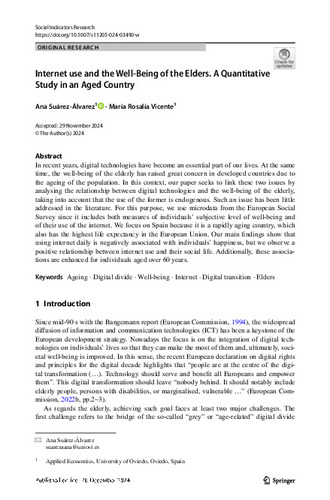Internet use and the Well-Being of the Elders. A Quantitative Study in an Aged Country
Autor(es) y otros:
Fecha de publicación:
Versión del editor:
Citación:
Resumen:
In recent years, digital technologies have become an essential part of our lives. At the same time, the well-being of the elderly has raised great concern in developed countries due to the ageing of the population. In this context, our paper seeks to link these two issues by analysing the relationship between digital technologies and the well-being of the elderly, taking into account that the use of the former is endogenous. Such an issue has been little addressed in the literature. For this purpose, we use microdata from the European Social Survey since it includes both measures of individuals’ subjective level of well-being and of their use of the internet. We focus on Spain because it is a rapidly aging country, which also has the highest life expectancy in the European Union. Our main findings show that using internet daily is negatively associated with individuals’ happiness, but we observe a positive relationship between internet use and their social life. Additionally, these associations are enhanced for individuals aged over 60 years.
In recent years, digital technologies have become an essential part of our lives. At the same time, the well-being of the elderly has raised great concern in developed countries due to the ageing of the population. In this context, our paper seeks to link these two issues by analysing the relationship between digital technologies and the well-being of the elderly, taking into account that the use of the former is endogenous. Such an issue has been little addressed in the literature. For this purpose, we use microdata from the European Social Survey since it includes both measures of individuals’ subjective level of well-being and of their use of the internet. We focus on Spain because it is a rapidly aging country, which also has the highest life expectancy in the European Union. Our main findings show that using internet daily is negatively associated with individuals’ happiness, but we observe a positive relationship between internet use and their social life. Additionally, these associations are enhanced for individuals aged over 60 years.
Patrocinado por:
Open Access funding provided thanks to the CRUE-CSIC agreement with Springer Nature. Ministerio de Ciencia e Innovación,TED2021-129341B-I00, PI: María Rosalía Vicente
Colecciones
- Artículos [37548]
- Economía Aplicada [221]
- Investigaciones y Documentos OpenAIRE [8420]
Ficheros en el ítem





